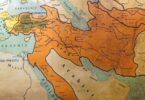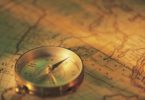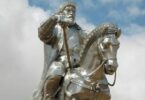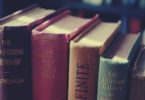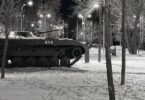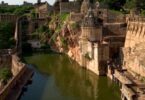What was the main political ideology of the Soviet Union during its existence?
(a) Capitalism
(b) Fascism
(c) Socialism
(d) Monarchy
What country did USSR and Germany divide between them under Molotov-Ribbentrop Pact?
(a) Poland
(b) Mongolia
(c) Czechoslovakia
(d) Hungary
The Great Patriotic War is the term commonly used in the Union soviétique for which major historical event?
(a) Russian Revolution
(b) World War I
(c) Russian Civil War
(d) World War II
Which of the following countries was NOT a part of the Soviet Union?
(a) Ukraine
(b) Czechoslovakia
(c) Belarus
(d) Kazakhstan
What key event in 1991 marked the formal dissolution of the Soviet Union?
(a) Signing of the Warsaw Pact
(b) Berlin Wall collapse
(c) Chernobyl disaster
(d) Signing of the Belavezha Accords
Which leader is most associated with the de-Stalinization process in the U.S.S.R.?
(a) Vladimir Lenin
(b) Joseph Stalin
(c) Leon Trotsky
(d) Nikita Khrushchev
Which Soviet leader’s policy of “peaceful coexistence” with the West led to a period of relative easing of tensions during the Cold War?
(a) Joseph Stalin
(b) Nikita Khrushchev
(c) Leon Trotsky
(d) Mikhail Gorbachev
Which policy implemented by Mikhail Gorbachev aimed to restructure the economy and promote openness but inadvertently accelerated the unraveling of the Soviet system?
(a) Perestroika
(b) Collectivization
(c) Glasnost
(d) Five-Year Plans
What was the most populous country within the Soviet Union?
(a) Russia
(b) Ukraine
(c) Finland
(d) Uzbekistan
Which country is known as “Soviet’s Vietnam”?
(a) China
(b) Afghanistan
(c) Iran
(d) South Africa
Who was the founding leader of the U.S.S.R.?
(a) Vladimir Lenin
(b) Joseph Stalin
(c) Nikita Khrushchev
(d) Mikhail Gorbachev
Which of the following countries bordered the USSR to the west?
(a) China
(b) Switzerland
(c) Poland
(d) Mongolia
How did the Cold War’s end affect the relationship between the US and the USSR?
(a) They engaged in direct military conflict.
(b) They experienced improved diplomatic relations and reduced tensions.
Who ruled USSR for the longest period of time?
(a) Leon Trotsky
(b) Nikita Khrushchev
(c) Joseph Stalin
(d) Mikhail Gorbachev
Which body of water served as the northern maritime border of the USSR?
(a) Mediterranean Sea
(b) Black Sea
(c) Baltic Sea
(d) Caspian Sea
Which Soviet leader was known for his military leadership and strategic decisions during the Battle of Stalingrad?
(a) Vladimir Lenin
(b) Nikita Khrushchev
(c) Georgy Zhukov
(d) Leon Trotsky
What was the name of the conflict that emerged after World War II between the United States and its allies and the Soviet Union and its allies?
(a) Cold War
(b) Korean War
(c) Vietnam War
(d) Gulf War
Who was the last leader of the Soviet Union?
(a) Leon Trotsky
(b) Mikhail Gorbachev
(c) Joseph Stalin
(d) Nikita Khrushchev
What position did Vyacheslav Molotov hold during World War II?
(a) Premier of the Soviet Union
(b) Minister of Defense
(c) Chief of the General Staff
(d) Foreign Minister
The southernmost point of the USSR extended to?
(a) Ural Mountains
(b) Caucasus Mountains
(c) Siberian Plateau
(d) Lake Baikal
Which economic policy implemented in the USSR during the 1980s aimed to restructure and modernize the economy?
(a) Perestroika
(b) Glasnost
(c) Collectivization
(d) Five-Year Plans
Which Soviet achievement marked a significant milestone in space exploration by launching Yuri Gagarin into the orbit?
(a) Launch of Sputnik 1
(b) Launch of Vostok 1
Which event marked the beginning of the Russian Revolution?
(a) October Revolution
(b) February Revolution
(c) Cuban Missile Crisis
(d) Chernobyl Disaster
What political movement led to increased openness, political freedom, and transparency?
(a) Bolshevik Revolution
(b) Prague Spring
(c) Glasnost
(d) Great Purge
What event in 1962 brought the Soviet Union and the United States to the brink of nuclear war?
(a) Berlin Airlift
(b) Korean War
(c) Cuban Missile Crisis
(d) Suez Crisis
Which Soviet achievement contributed to significant advancements in mathematics and cryptography during World War II?
(a) Development of the first supercomputer
(b) Invention of the microchip
(c) Creation of the first electronic calculator
(d) Breaking the German Enigma code
Which controversial event in 1956 exposed the harsh realities of Stalin’s rule?
(a) Cuban Missile Crisis
(b) Prague Spring
(c) Hungarian Revolution
(d) Berlin Blockade
What catastrophic nuclear event occurred in 1986 in Pripyat?
(a) Chernobyl Disaster
(b) Cuban Missile Crisis
(c) Kursk Submarine Disaster
(d) Leningrad Blockade
In what year did Estonia, Latvia, and Lithuania regain their independence?
(a) 1985
(b) 1989
(c) 1991
(d) 1993
Which major battle during World War II is often considered a turning point on the Eastern Front, where the Sowjetunion successfully halted the German advance and began to push the Germans back?
(a) Battle of Stalingrad
(b) Battle of Kursk
(c) Battle of Moscow
(d) Battle of Leningrad
Which event marked the Bolsheviks’ overthrow of the Provisional Government?
(a) October Revolution
(b) February Revolution
(c) Russian Civil War
(d) Treaty of Brest-Litovsk
What infamous political event conducted in the late 1930s led to the execution or imprisonment of many perceived enemies of the state?
(a) KGB Surveillance Program
(b) Velvet Revolution
(c) Great Leap Forward
(d) Great Purge
What was the main military alliance formed by the Sowjetunion, the United Kingdom, and the United States to fight against the Axis powers during World War II?
(a) Warsaw Pact
(b) Axis Alliance
(c) United Nations
(d) Allied Powers
Which political party was founded by Vladimir Lenin?
(a) Conservative Party
(b) Liberal Democrats
(c) Bolshevik Party
(d) National Front

